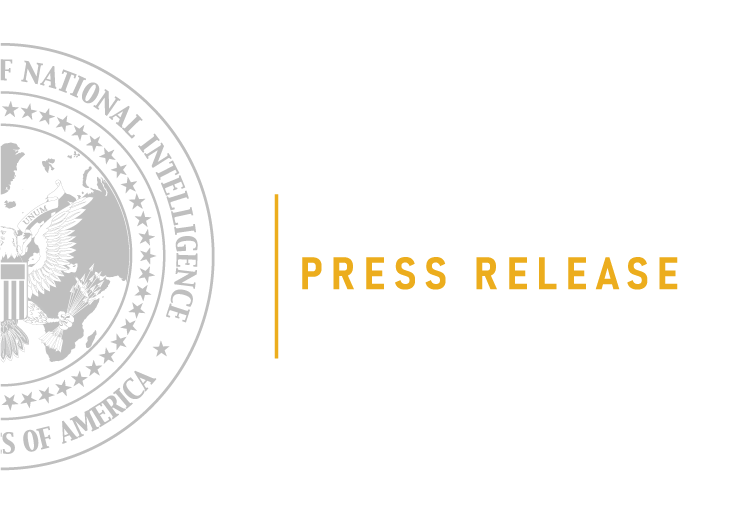FOR IMMEDIATE RELEASE
ODNI News Release No. 09-25
May 2, 2025
ODNI Releases September 2024 FISC Opinion on
FISA 702 Certification Amendments
WASHINGTON, D.C. - Today, the Office of the Director of National Intelligence (ODNI), in consultation with the Department of Justice (DOJ), is publicly releasing a September 2024 Foreign Intelligence Surveillance Court (FISC) opinion with redactions.
The September 2024 FISC Opinion is the first FISC opinion issued after the re-authorization of Section 702 on April 20, 2024, and discusses many of the changes implemented under the Reforming Intelligence and Securing America Act (RISAA) and how the U.S. Government (USG) ensured the associated procedures conform to the new legislation.
RISAA required the USG to seek, within 90 days of reauthorization, an order from the FISC approving modifications to any existing Section 702 certifications that incorporated the new requirements introduced by RISAA. Accordingly, on July 19, 2024, the USG submitted amended certifications, along with updated targeting, minimization, and querying procedures, to the FISC.
On July 23, 2024, the FISC determined that the USG’s amended certifications and accompanying legal procedure submissions involved one or more novel or significant interpretations of law, and therefore appointed amici curiae to address the following questions:
(1) does Section 702(f) of FISA, as amended by RISAA, including but not limited to section 3(a) (which generally prohibits FBI from conducting evidence-of-crime-only (EOCO) queries), apply to querying or accessing information acquired under authorizations pursuant to Section 702(a) that were documented in certifications submitted to the FISC under Section 702(h) before January 1, 2024? If so, what effect should section 18(d)(2) of RISAA be understood to have; and
(2) with respect to travel vetting, do NSA’s revised querying procedures and minimization procedures comport with the definition of “minimization procedures” at 50 U.S.C. §§ 1801(h) and 1821(4) and the requirements of the Fourth Amendment?
Pursuant to the FISC’s direction, amici curiae and the USG briefed these two issues for the Court. As to the first question, the FBI’s revised query procedures, as submitted, prohibited evidence-of-crime-only queries irrespective of the certification under which the collection was acquired. The FISC ultimately found that RISAA’s amendments to Section 702(f) that pertain to requirements for querying procedures, including the general prohibition on FBI conducting evidence-of-crime-only queries, apply only to information acquired under certifications submitted in 2024 and thereafter. The FISC, nevertheless, approved the revised querying procedures because they comply with the requirements for both pre- and post-2024 certifications and noted that, in some circumstances, the evidence-of-crime-only query prohibition will apply “by force of the revised procedures rather than direct operation of the statute.”
On the second question, the FISC held that NSA’s revised travel vetting procedures complied with FISA and the Fourth Amendment.
The remainder of the September 2024 opinion primarily addresses updates to compliance issues already discussed in the FISC’s April 2024 opinion. Of note, the FISC stated that “FBI seems to be continuing to improve its implementation of the querying standard.” The FISC also credited RISAA’s requirement that DOJ audit every single U.S. person query conducted by FBI as contributing to FBI’s improved compliance. With respect to NSA, the FISC indicated that it was satisfied with the remedial measures NSA had taken to address certain incidents involving NSA’s travel-vetting process.
This opinion contained a significant or novel construction of law. As a result, DOJ produced a classified version of this opinion to the appropriate congressional committees within 45 days of its issuance. ODNI also produced the classified versions of the opinion, certifications, and procedures to the Privacy and Civil Liberties Oversight Board (PCLOB).
Consistent with Executive Order 13526, when developing the redacted copies of the FISC opinion, ODNI consults with DOJ, NSA, CIA, and FBI to identify what information must remain redacted because it will cause exceptionally grave or serious damage to national security. This review is also conducted to ensure that information is not redacted to conceal violations of law, inefficiency, or administrative error or to prevent embarrassment to a person, organization or agency.
The information is redacted because it will reveal sources and methods that can cause exceptionally grave or serious damage to national security. Revealing such information would provide means for adversaries to change their behaviors and avoid detection. Many of the redactions relate to detailed factual descriptions of specific targets, techniques, and technology that support the FISC’s finding that the certifications and procedures meet statutory requirements and are consistent with the Fourth Amendment. While the specific sensitive facts must remain classified, the legal analysis leading to the Court’s finding are unclassified and being released.
Additionally, to protect the integrity of ongoing law enforcement investigation of intentional violations of FISA, certain redactions were made.
The document is posted in full-text searchable format on intel.gov.
This FISC opinion is being released pursuant to 50 U.S.C. § 1872. This opinion, along with previous FISC opinions and additional public information on national security authorities, is available on www.dni.gov and intel.gov.
###





